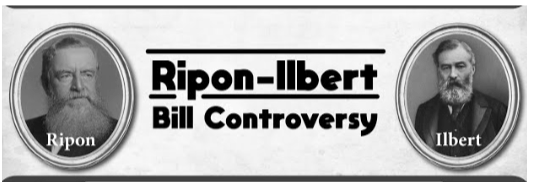This article covers “Ilbert Bill Controversy”. This topic has relevance in the “Modern History” section of the UPSC CSE exam.
What is Ilbert Bill?
- Ilbert bill was introduced in 1883, the then Viceroy Lord Ripon and Sir Courtenay Ilbert, the legal adviser to the Council of India, gave Indian judges the authority to hear cases against Europeans.
- However, there was a prominent backlash against the Ilbert Bill Controversy from Indian and the British citizens in Britain. The arguments raised in opposition to this law revealed the English’s pervasive racial prejudice against Indians.
- As a result, the educated Indians were also made aware of the true character of British colonialism.

Background
- Before the Ilbert bill was introduced, Indian magistrates were not allowed to trial the British subjects in 1873. The only court that could hear cases involving death or transportation was a higher court.
Analysis of Ilbert Bill Controversy
| Against Ilbert Bill | – Anger and animosity were high among the European, whom the Europeans consider inferior, should be trial by an Indian. The Ilbert bill controversy sparked intense opposition from the European commercial sector included tea and indigo planters in Calcutta. – Even secret support came from a number of officials. Deep-seated racial stereotypes that were widespread at the time were the foundation of the dispute at the time. – The propaganda that Indian judges could not be reliable in dealing with cases linking many English females helped raise support against the bill. – Additionally, another opponent, signifies that the Ilbert Bill would “raise dangerous race hatred by inculcating the idea that justice which is good enough for natives is good enough for Europeans“. – Further, Deep racial biases became more predominant through declaring that Indian judges were untrustworthy and unfit regarding cases against European defendants. – Rallies, protests and discourse on the subject such as cartoons of Indian magistrates with animal-like features, and using terms such as ‘unchangeable, spotted leopards‘ and ‘wily snakes.’ – They also feared that as the number of natives seeking an education was increasing from European efforts, thus more magistrates would become eligible to preside over trials with British defendants. |
| In favour of Ilbert Bill | – Majority of the native Indians strongly supported the Ilbert bill as the European sense of racial superiority infuriated and frustrated them. – European systems of education introduced by British government in order to create a well-educated Indian upper-class and the Ilbert Bill would have given more authority to Indian magistrates who were the product of these systems. – Despite of these frustrations, reports show that the Indian supporters of the bill were neither as vocal nor as well organized as the bill’s opponents. |
What was the Resolution?
- Initially, as a result of popular disapproval of the Ilbert Bill by a majority of British women living in India, Viceroy Ripon passed an amendment, whereby a jury of 50% Europeans was required if an Indian judge was to face a European in the Court.
- Finally, to overcome the Ilbert bill controversy solution was adopted by way of compromise. However, a defendant would in all cases have the right to claim trial by a jury of which at least half the members must be European.
- The Jurisdiction for trial of Europeans would be conferred on European and Indian District Magistrates and Sessions Judges alike. However, in any case the defendant has the right to request a trial in front of a jury in which at least half of the jurors must be European.
Further, the bill was then passed on January 25, 1884 as the Criminal Procedure Code Amendment Act 1884. The Ilbert bill controversy and the amendment to the same helped to endorse Indian national awareness and a demand for larger Indian autonomy.
GS - 1
